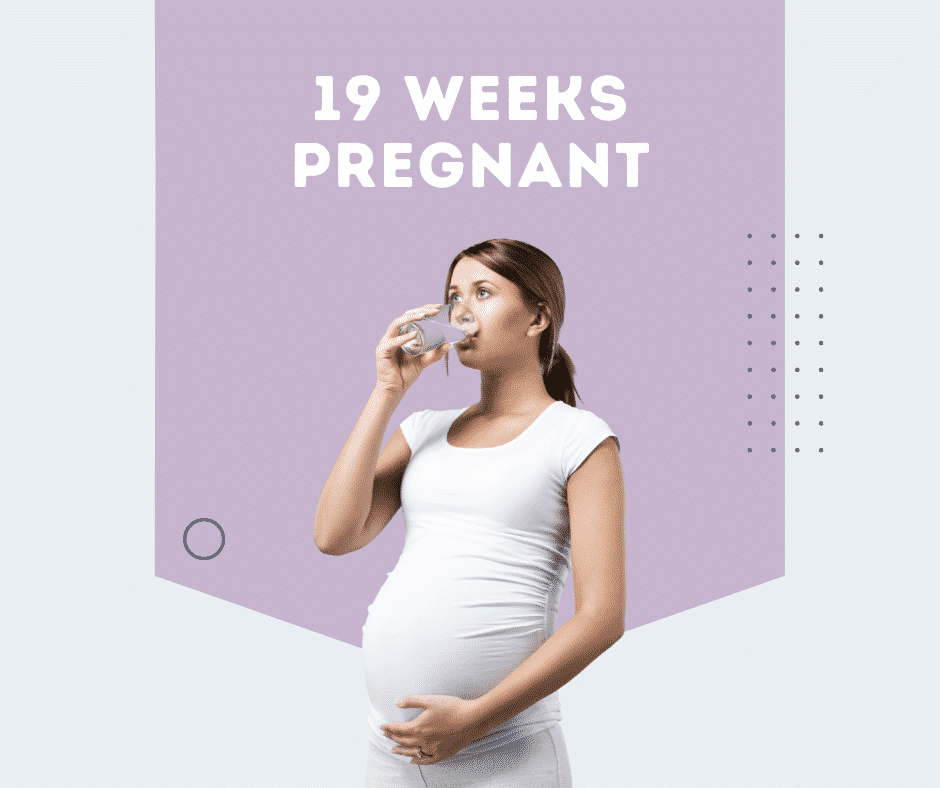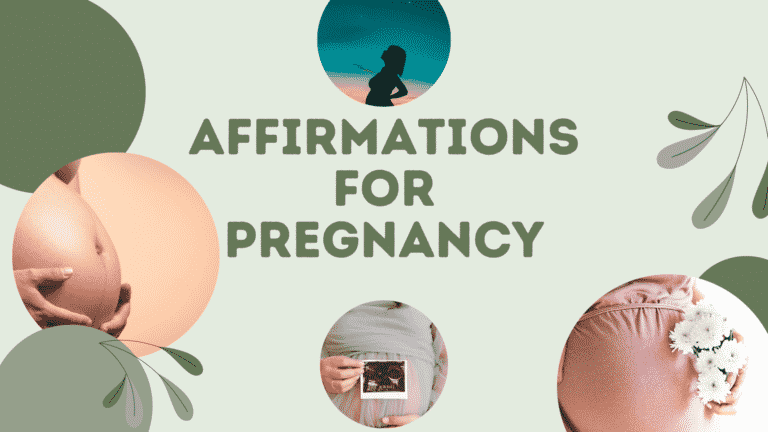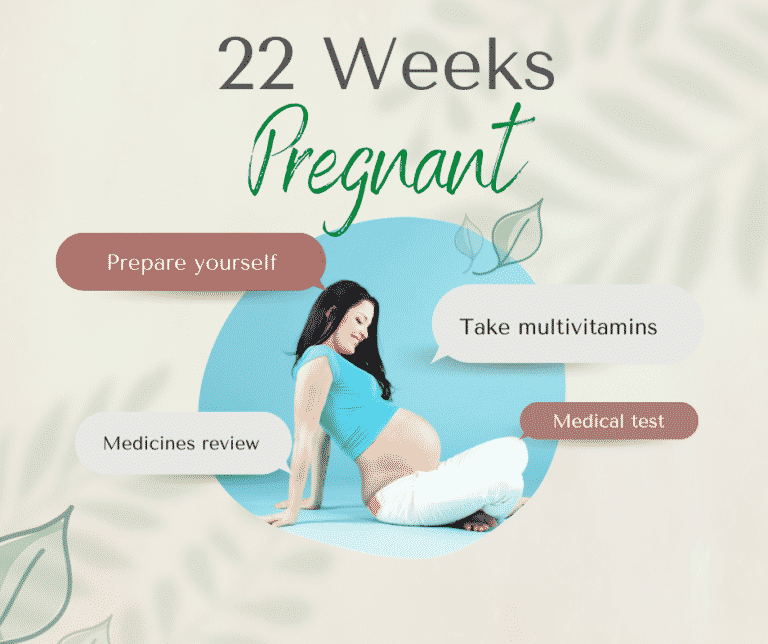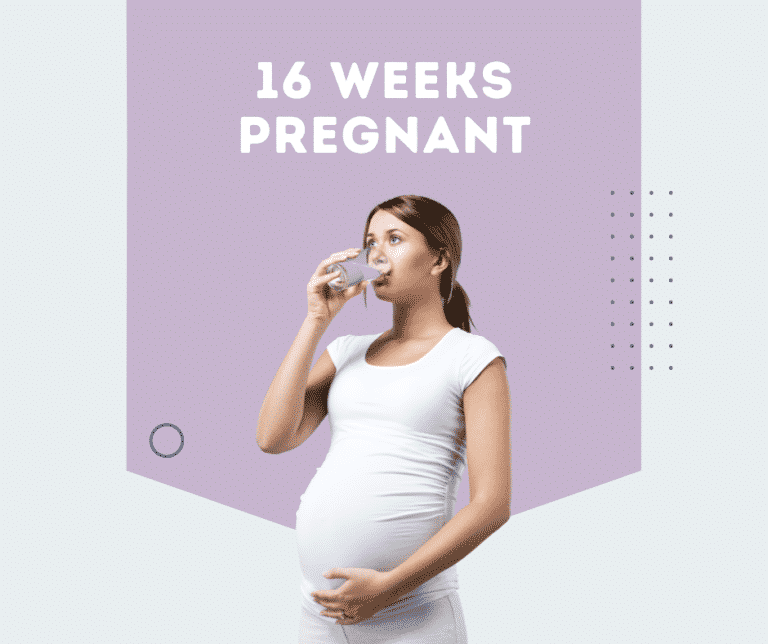19 Weeks Pregnant: Signs, Tips, Symptoms, Baby’s Development
Published on April 1, 2022 – Last Updated on October 18, 2022
Are you 19 weeks pregnant? This is an essential time in your pregnancy. You may be feeling more energetic, and your baby is growing rapidly. This is an exciting time as you gear up for the arrival of your little one. There are a few things to keep in mind as you head into the final weeks of your pregnancy.
This blog post will discuss important things to keep in mind during your 19th week of pregnancy. We will cover common symptoms, fetal development, and preparing for labor and delivery. We hope you find this information helpful and informative.
What to expect during the 19th week of pregnancy
During 19 weeks of pregnancy, you may expect the following:
- You may feel more energetic as your pregnancy progresses.
- Your baby is growing rapidly and may weigh up to 10 ounces.
- You may experience Braxton Hicks contractions and sporadic and painless uterus contractions.
- You may begin to feel fetal movement, known as quickening.
- You may notice an increase in vaginal discharge.
- You may experience heartburn, constipation, and swollen ankles.
How many weeks am I pregnant from my last period is one of our posts, where you can find out exactly in the stage of pregnancy are you.
You may feel more energetic as your pregnancy progresses.
As your pregnancy progresses, you may find that you have more energy. This is because your body is working harder to support your growing baby. You will likely need to rest more as your pregnancy continues, but you should continue to stay active and exercise as recommended by your doctor.
Get started using the best pregnancy app for free.
Your baby is growing rapidly.
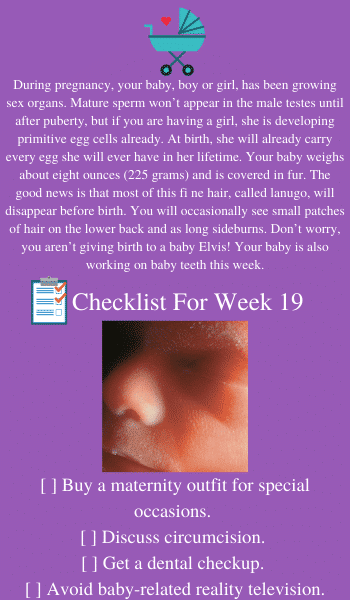
Make sure to check out our Pregnancy Week by Week post where you can find great information for each stage of pregnancy based on weeks.
By the 19th week of pregnancy, your baby will have grown to be about 10 ounces and may be as long as 6 inches from crown to rump. Your baby’s head will make up about one-third of its total length. Your pregnancy hormones can increase blood flow to your nose, making you develop nasal congestion. Your baby is also beginning to create more fat under their skin, which will help to keep them warm after they are born.
You may begin to feel fetal movement, known as quickening, during the 19th week of pregnancy. Quickening is often described as feeling like a flutter in your stomach. This is caused by your baby’s moving becoming stronger and more pronounced. If you have not yet felt quickening, don’t worry; it is often not felt until later in pregnancy. Also, There is a Waterproof mixture. This waterproof mixture protects your baby’s skin from his 24/7 bath — the amniotic fluid — and lubricates the birth canal.
19 Weeks Fetus
At 19 weeks, your fetus is roughly the size of a large mango. They weigh approximately 10 ounces and are around 6 inches long from head to bottom. You may be able to see their little arms and legs moving around inside your belly. Your baby’s bones are beginning to harden, and their skin is becoming less transparent. Lanugo, a soft downy hair, covers their body and will eventually fall off before birth. You may be able to feel your baby’s movements at this stage, known as quickening.
These can feel like gentle flutters or rolls. If you haven’t felt movement yet, don’t worry – some women don’t feel quickening until 22 weeks or later. Your baby’s sense of hearing is also well developed at 19 weeks. They will react to loud noises by moving or becoming quieter. Your baby’s sleeping habits are also starting to form now, with both active and peaceful sleep periods. By 19 weeks, your baby is growing rapidly and beginning to look more like a miniature version of itself. It’s a fantastic process to watch!
You may experience Braxton Hicks contractions.
Braxton Hicks contractions are sporadic and painless uterus contractions during pregnancy week 19. These contractions are not a sign of labor, but they can be uncomfortable. If you experience Braxton Hicks contractions, try to drink plenty of fluids and rest as much as possible. Read more about contractions: contraction timer when to go to the hospital, contraction counter app & best app to track contractions.
You may notice an increase in vaginal discharge.
During pregnancy week 19, you may notice an increase in vaginal discharge. This is normal and is caused by the increased blood flow to the area. The discharge should be clear or white and should not have a strong odor. If you notice a change in your discharge, such as an increase in amount, change in color, or strong smell, you should contact your doctor.
You may experience heartburn, constipation, and swollen ankles.
At 19 weeks pregnant, you may experience heartburn, constipation, and swollen ankles. These are all common symptoms of pregnancy week 19 and can be alleviated by drinking plenty of fluids and eating a healthy diet. However, if you have severe symptoms, you should contact your doctor.
Changes in your body and baby
You Belly may be growing more each week, You may be feeling more energetic, and your baby is growing rapidly. However, you may have some aches and pains as your body adjusts to your new weight. For example, a pregnant person may feel Abdominal pain on their right side caused by the baby pushing against their intestines. You may also feel pain in your lower abdomen since your growing uterus can put pressure on blood vessels and slow your circulation.
Round ligament pain: As your uterus grows, the ligaments that link it to your pelvis stretch and may cause occasional sharp pains.
Baby’s development:
Baby’s Growth:
The baby is growing rapidly and should be about 10 ounces and 6 inches long by this week.
Baby’s Head:
At 19 weeks pregnant, The head is almost one-third of the entire length of the baby.
Baby’s Eyes:
The eyes are now in their final position, but the eyelids are still fused shut.
Baby’s skin:
The skin is covered in vernix caseosa, a white, cheese-like substance that protects the skin from the amniotic fluid.
Baby’s immune system:
At 19 weeks pregnant, The thymus, a gland essential for developing the immune system, is beginning to grow.
Baby’s Gland:
The thymus, an essential gland for developing the immune system, is beginning to grow.
Pregnancy Symptoms
Symptoms are the most common question that 19 weeks pregnant women ask. The most common symptoms are:
- Nausea and vomiting
- Extreme fatigue
- Heartburn and constipation
- Braxton Hicks contractions
- Swollen ankles, hands, and feet
- Leaky breasts
- Backaches
Nausea and vomiting:
Around 70% of 19 weeks pregnant experience nausea and vomiting. For most women, it peaks around week 8 and subsides by week 12. Although unpleasant, these symptoms usually aren’t harmful to you or your baby.
Extreme fatigue:
Fatigue is another prevalent symptom in early pregnancy. Around 50% of 19 weeks pregnant women experience extreme fatigue. It’s caused by the increase in hormone levels and leg cramps and usually subsides by the end of the first trimester and the start of the second trimester.
Heartburn and constipation:
Both heartburn and constipation are common complaints during pregnancy. About half of 19 weeks of pregnant women will suffer from heartburn, while constipation is a problem for pregnant women around a third of 19 weeks.
Braxton Hicks contractions:
Around 20% of 19 weeks, pregnant women experience Braxton Hicks contractions, which are mild uterine cramps that can occur during pregnancy but are most common in the third trimester. They’re named after the doctor who first described them. Although they may be uncomfortable, they’re not harmful to you or your baby.
Swollen ankles, hands, and feet:
Swelling is normal in pregnancy. It’s caused by the extra fluid your body is holding on to in preparation for labor. Node is most common in the ankles and feet but can also occur in the hands and face.
Leaky breasts:
Leaky breasts, also called colostrum leakage, are another usual pregnancy symptom. Colostrum is the first milk your body produces, and it’s high in nutrients and antibodies. It may leak from your nipples during pregnancy, but it’s most common in the last few weeks.
Backaches:
Backaches are expected in 19 weeks pregnant women, especially in the latter stages of pregnancy. They’re caused by the extra weight you’re carrying and the change in your posture. A good mattress and plenty of rest can help to alleviate backaches.
Tips for Healthy Pregnancy:
You can do a few things to help ensure a healthy pregnancy, both for yourself and your baby.
Drink Plenty of Fluids:
It’s essential to stay hydrated during pregnancy. Aim for eight to 12 glasses of water per day or more if you’re thirsty. You can also get fluids from other beverages, such as juice and milk. Limit caffeine, as it can be dehydrating and isn’t good for the baby.
Eat a Healthy Diet:
Eating a healthy diet is crucial during pregnancy. Eat plenty of fruits, vegetables, whole grains, and lean protein. You should also limit sugary and fatty foods. If you’re having trouble eating enough or getting the nutrients you need, talk to your doctor about taking a prenatal vitamin.
Get Plenty of Rest:
Getting enough rest is essential for both your physical and mental health. Aim to get at least eight hours of sleep per night. Try relaxation techniques such as reading or taking a warm bath before bedtime if you’re having trouble sleeping.
Stay Active:
Staying active during pregnancy is good for your health and can help reduce stress levels. Try to get at least 30 minutes of exercise per day. If you’re not used to exercising, start slow and gradually increase the intensity. Always talk to your doctor before starting a new exercise routine.
Recommended doctor visits during
It’s essential to keep up with your doctor appointments during pregnancy. At most 19 weeks, pregnant will see their doctor or midwife every four weeks until 28 weeks, then every two weeks until 36 weeks, and then weekly until delivery. You may need to come in more often if you have a high-risk pregnancy. These appointments are essential for monitoring your health and your baby’s development.
Your first doctor’s appointment will usually be around eight weeks after your last period. This is an excellent time to ask any questions about pregnancy and get information about nutrition, exercise, and prenatal vitamins.
Mid Pregnancy Ultrasound
At your 19-week ultrasound, you may be able to see your baby’s gender if you want to know. You’ll also see how your baby is developing and get an idea about the size. Next, your doctor or midwife will check your baby’s position and make sure that they’re growing at a healthy rate. Finally, you’ll be given the go-ahead to continue your pregnancy if everything looks good.
If there are any concerns, your doctor may order further tests or refer you to a specialist. However, it’s important to remember that these tests are just a precaution and that most babies are healthy regardless of any problems found.
FAQS
Where is my baby at 19 weeks in my stomach?
No, your baby is not in your stomach at 19 weeks. At around week six of development, babies start to move into the uterus (womb).
Can you feel kicks at 19 weeks?
You May feel the Baby’s Movement by 19 Weeks; women often feel Kicks.
Generally, by the end of the nineteenth week, expectant mothers will be able to feel their baby move. The movements may be described as flutter, tickle, or punch.
Other Pregnancy Weeks:
- 1 Week Pregnant
- 2 Weeks Pregnant
- 3 Weeks Pregnant
- 4 Weeks Pregnant
- 5 Weeks Pregnant
- 6 Weeks Pregnant
- 7 Weeks Pregnant
- 8 Weeks Pregnant
- 9 Weeks Pregnant
- 10 Weeks Pregnant
- 11 Weeks Pregnant
- 12 Weeks Pregnant
- 13 Weeks Pregnant
- 14 Weeks Pregnant
- 15 Weeks Pregnant
- 16 Weeks Pregnant
- 17 Weeks Pregnant
- 18 Weeks Pregnant
- 20 Weeks Pregnant
- 21 Weeks Pregnant
- 22 Weeks Pregnant
- 23 Weeks Pregnant
- 24 Weeks Pregnant
- 25 Weeks Pregnant
- 26 Weeks Pregnant
- 27 Weeks Pregnant
- 28 Weeks Pregnant
- 29 Weeks Pregnant
- 30 Weeks Pregnant
- 31 Weeks Pregnant
- 32 Weeks Pregnant
- 33 Weeks Pregnant
- 34 Weeks Pregnant
- 35 Weeks Pregnant
- 36 Weeks Pregnant
- 37 Weeks Pregnant
- 38 Weeks Pregnant
- 39 Weeks Pregnant
- 40 Weeks Pregnant
- Birth Plan
- Baby Due Date Calculator
- EDD Calculation
- how many weeks pregnant I am

